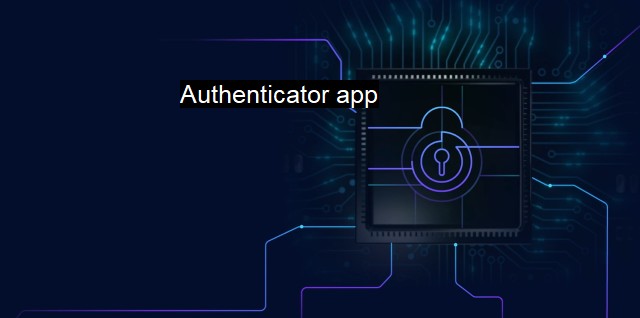What is Authenticator app?
Enhanced Security and Protection: The Rise of Authenticator Apps in Cybersecurity
In the realm of cybersecurity and antivirus protection, an "Authenticator App" is playing an increasingly critical role. This type of software tool is designed to generate two-factor authentication (2FA) or multi-factor authentication (MFA) codes for additional security. To fundamentally understand their role, it's necessary to delve into its underlying technology, functionality, and key benefits.An Authenticator App is essentially a cybersecurity tool used to verify the identity of the user. It is typically employed as part of a two-factor or multi-factor authentication process, which serves as an additional line of defense beyond the traditional username-and-password gatekeeping model. Having such an app is like having a digital locksmith, offering an extra barrier and lock that unauthorized people find difficult to penetrate.
Two-factor or multi-factor authentication imbues software applications and online service accounts with added layers of security. Starting with something familiar, the user knows their "username" and "password," but this is vulnerable to a variety of cyberattacks like keylogging or phishing attacks, enticing individuals to cough up sensitive information unwittingly.
Herein, Authenticator apps come into play as "the second factor" by generating random, time-based, unique codes that expire after a short duration. These applications work on an algorithm to generate these codes, usually valid only for a certain duration – often 30 seconds. The user then enters this code (the so-called second factor, something they have, rather than something they know like a password) to authenticate their identity. This authentication process therefore involves two distinct factors: the password (something the user knows) and the unique code generated by the Authenticator App (something the user has).
Now let's delve into the various settings where an Authenticator App finds its utility. when logging into a social media account from a new device, the platform might ask for additional proof to verify the account owner's identity in the form of a code provided by an Authenticator App. The same method can apply universally to various platforms, including banking, ecommerce, healthcare, or enterprise applications.
From a cybersecurity standpoint, using such apps is highly recommendable as it curtails numerous potential risks. Remaining one step ahead of cybercriminals is an ongoing challenge, and authentication apps represent a further step that fraudsters must bypass, making their task significantly harder.
There are several well-known Authenticator apps available in the market, such as Google Authenticator, Microsoft Authenticator, or Authy. These apps are often free and compatible with the majority of online platforms, making them a cost-effective and usable security tool. Most cryptographic apps use cryptographic algorithms, for instance, HMAC-SHA1, which generates OTPs based on the number of time slots passed since a defined epoch, providing high-level security protocols.
As note-worthy as the added security protection Authenticator Apps provide, they are not without potential drawbacks. Users may find them inconvenient as required to validate their identity frequently, especially if they swap devices often. losing access to the device running the Authenticator App can result in arduous recovery processes. But as cybercrime sophistication grows, such an additional line of defense is increasingly essential.
The state of global cyber threats is more nettlesome today. The additional ounce of prevention provided by Authenticator Apps is surely more prudent than dealing with intrusive, exploitative cyber invasions later. As high-profile hacking incidents become more commonplace, Authenticator Apps become more than just a desirable add-on but an indispensable ally for cybersecurity. They play a pivotal role in protecting users' digital data, increasing cybersecurity robustness within individuals and organizations alike, making them a must-have tool in the world of cybersecurity and antivirus protection.

Authenticator app FAQs
What is an authenticator app?
An authenticator app is a mobile application that generates random codes or one-time passwords (OTPs) to authenticate a user's identity. These codes are used to secure online accounts from unauthorized access or cyber threats.What are the benefits of using an authenticator app?
Using an authenticator app provides an additional layer of security to your online accounts. It makes it difficult for hackers to gain access to your personal information or steal your credentials. Authenticator apps are convenient, easy to use, and offer faster login and authentication processes.Which is the best authenticator app?
There are several authenticator apps available, including Google Authenticator, Microsoft Authenticator, Authy, and LastPass Authenticator. Each of these apps offers unique features and security options. Choosing the best authenticator app depends on your specific needs and preferences.Is an authenticator app better than antivirus software?
An authenticator app and antivirus software serve different purposes. An authenticator app provides an additional layer of security to your online accounts, whereas antivirus software protects your devices from malware and cyber threats. Both are necessary to ensure your online safety and security.| | A | | | B | | | C | | | D | | | E | | | F | | | G | | | H | | | I | | | J | | | K | | | L | | | M | |
| | N | | | O | | | P | | | Q | | | R | | | S | | | T | | | U | | | V | | | W | | | X | | | Y | | | Z | |
| | 1 | | | 2 | | | 3 | | | 4 | | | 7 | | | 8 | | |||||||